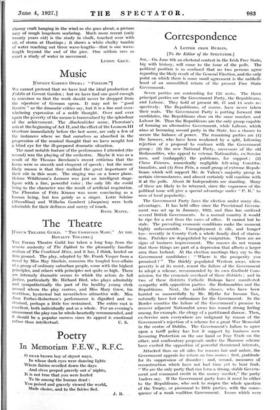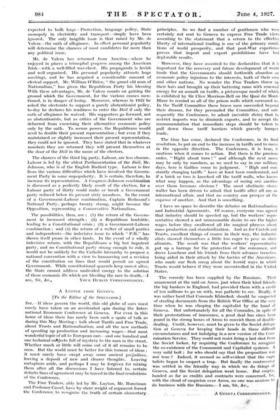Correspondence
A LETTER FROM Deems. [To the Editor of the SPECTATOR.]
SIR,—On June 9th an electoral contest in the Irish Free State, big with history, will come to the issue of the polls. The political position is so confused that no two persons agree regarding the likely result of the General Election, and the only point on which there is some small agreement is the unlikeli- hood of an unmodified return of the present Free State Government.
Seven parties are contending for 153 seats. The three principal parties are the Government Party, the Republicans, and Labour. They hold at present 60, 47 and 14 seats re- spectively. The Republicans, of course, have never taken their seats. The Government Party is putting forward 100 candidates, the Republicans close on the same number, and Labour 50. Thus the Republicans are the only group capable of forming an alternative Government, while Labour, which aims at becoming second party in the State, has a chance to secure the balance of power. The remaining parties are (1) the farmers, who have been weakened by a split, following rejection of a proposal to coalesce with the Government group ; (2) the new National Party, successors of the old Redmondites, who appeal to veteran Nationalists, cx-Service men, and (unhappily) the publicans, for support ; (3) Clann Eireann, numerically negligible left-wing Constitu. tionalists, and (4) Sinn Fein, a small group of extreme Repub- licans which will support Mr. de Valera's majority group in certain circumstances, and almost certainly will combine with it at the polls. About 30 Independents are standing. Many of these are likely to be returned, since the vagueness of the political issue will give a special advantage under " P. R." to men of local popularity.
The Government Party faces the election under many dis. advantages. It has held office since the Provisional Govern- ment was set up in January, 1922, and thus has outlived several British Governments. In a normal country it would be ripe for a rest from the cares of office. It cannot but be stale. The prevailing economic conditions make the moment highly unfavourable. Unemployment is rife, and hunger too—recently in County Cork a whole family died of starva- tion. Parishes are depopulated by emigration. There are no signs of business improvement. The masses do not reason that these things are part of a depression that affects a larger area than Ireland.. At the election meetings they cry to the Government candidates : " Where is the prosperity you promised 2 " The thickly populated Western areas, where poverty is at its worst, resent the failure of the Government to adopt a scheme, recommended by its own Gaeltacht Com- mission, for the economic overhaul of those districts ; and in two of these districts Catholic Bishops have manifested sympathy with opposition parties—the Redmondites and the Republicans. Next, the middle classes, who have been harried so unmercifully by Mr. Blythe for Income Tax, naturally have lost enthusiasm for the Government. In the Border counties the failure of the Government's promise to recover adjacent Nationalist areas has roused strong feeling among, for example, the clergy of a partitioned diocese. Then, ex-Service men everywhere are indignant by reason of the Government's rejection of a scheme for a great War Memorial in the centre of Dublin. The Government's failure to agree upon a tariff policy has lost it support by business men favouring Protection on the one hand or Free Trade on the other, and confiscatory proposals under the Shannon scheme have excited the opposition of powerful threatened interests.
Attacked thus on all sides for reasons fair and unfair, the Government appeals for return on two scores : first, gratitude for its suppression of disorder ; and, second, measures of reconstruction which have not had time yet to bear fruit. " We are the only party that can form a strong, stable Govern- ment and command credit in the money market," the party laaders say. If the Government party loses it must be either to the Republicans, who seek to reopen the whole question of the Treaty, or piecemeal to little parties, with the conse- quence of a weak coalition Government. Issues which were expected to bulk large—Protection, language policy, State monopoly in electricity and transport—simply have been ignored. The only tangible issue is that raised by Mr. de Valera—the oath of allegiance. • In effect personal popularity will determine the chances of most candidates far more than any political issue.
Mr. de Valera has returned from America—where he enjoyed in places a triumphal progress among the American Irish—with a well-filled •war-chest. His propaganda is lavish and well organized. His personal popularity attracts huge meetings, and • he has acquired a considerable amount of clerical support. Mr. William O'Brien; " the grand old man of Nationalism," has given the Republican Party his blessing With these advantages, Mr. de Valera counts on gaining the ground which the Governnient, for the various causes men- tioned, is in danger of losing. Moreover,. whereas in 1922 he asked the electorate to support a' purely' abstentionist policy, to-day he declares his readiness to enter the Dciil if only the oath of allegiance be waived. His supporters go forward, not as abstentionists, but as critics of the Government who are debarred from exercising their alternative economic policy only by the oath. To secure power, the Republicans would need to double their present representation ; but even if they maintained or slightly increased their present representation, they could not be igmored. They have stated that in whatever numbers they are returned they will present themselves at the door of the Dal in the name of the electors.
The chances of the third big party, Labour, are less obscure. Labour .is led by the ablest Parliamentarian of the Dal, Mr. Johnson, who is of the English Radical type. Labour is free from the various difficulties which have involved the Govern- ment Party in some unpOpularity. It is certain, therefore, to increase. its representation. A Cosgrave-Johnson combination is discussed as a perfectly likely result of the election, for a Labour party of thirty could make or break a Government party reduced below its present sixty members. In the event of a Government-Labour combination, Captain Redmond's National Party, perhaps twenty strong, might become the Opposition, representing a Conservative Nationalism.
The possibilities, then, are : (1) the return of the Govern- ment in increased strength ; (2) a Republican landslide, leading to a Constitutional crisis ; (3) a Government-Labour combination ; .and (4) the return of a welter of small parties and independents—the indecisive issue to which " P.R." has shown itself prone in other lands. In the event of a wholly indecisive return, with the Republicans a big but impotent party, and no Constitutional party strong enough to rule, it would not be. unlikely for the Catholic hierarchy to propose a national convention with a view to hammering out a revision of the constitution on lines that would permit an agreed Governinent. While constitutional quarrels keep unrest alive, the State cannot address undivided energy to the solution of those economic ills which are bleeding the race to death.—I







































 Previous page
Previous page